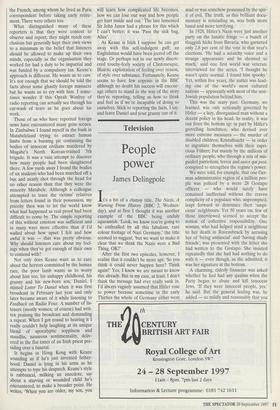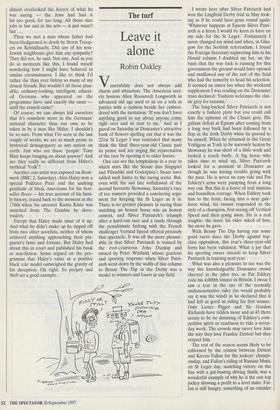Television
People power
James Delingpole
It's a bit of a clumsy title, The Nazis, A Warning From History (BBC 2, Wednes- day), and at first I thought it was another example of the BBC being unduly squeamish. 'Look, we know you're going to be enthralled by all this fabulous, rare colour footage of Nazi Germany,' the title seemed to suggest, tut we want to make it clear that we think the Nazis were a Bad Thing. OK?'
After the first two episodes, however, I realise that it couldn't be more apt: 'So you think it could never happen here? Think again!' Yes, I know we are meant to know this already. But in my case, at least, I don't think the message had ever really sunk in. I'd always vaguely assumed that Hitler rose to power because sometime in the early Thirties the whole of Germany either went mad or was somehow possessed by the spir- it of evil. The truth, as this brilliant docu- mentary is reminding us, was both more banal and more terrifying.
In 1928, Hitler's Nazis were just another party on the lunatic fringe — a bunch of thuggish hicks from Bavaria, who garnered only 2.8 per cent of the vote in that year's elections. 'He had a scratchy voice and a strange appearance and he shouted so much,' said one first world war veteran, interviewed for the series. 'I thought he wasn't quite normal. I found him spooky.' Yet, within five years, the nutter was lead- ing one of the world's most cultured nations — apparently with most of the non- Jewish population behind him.
This was the scary part. Germany, we learned, was only notionally governed by Hitler — a lazy, disorganised man without a decent policy in his head. In reality, it was run from the bottom up: in part by Hitler's grovelling henchmen, who devised ever more extreme measures — the murder of disabled children, Kristallnacht — in order to ingratiate themselves with their capri- cious Fiihrer; but mainly by the millions of ordinary people, who through a mix of mis- guided patriotism, terror and sauve qui peut, conspired to strengthen the regime's power.
We were told, for example, that one Ger- man administrative region of a million peo- ple was policed by a mere 28 Gestapo officers — who would surely have remained ineffectual without the craven complicity of a populace who, unprompted, leapt forward to denounce their 'suspi- cious' neighbours. Yet 50 years on, few of those interviewed seemed to accept the notion of collective responsibility. One woman, who had helped send a neighbour to her death in Ravensbruck by accusing her of 'being antisocial' and 'having shady friends', was presented with the letter she had written to the Gestapo. She insisted repeatedly that she had had nothing to do with it — even though, as she admitted, it was her signature at the bottom.
A charming, elderly financier was asked whether he had had any qualms when the Party began to abuse and kill innocent Jews. 'If they were innocent people, yes,' he said. But the general feeling was, he added — so mildly and reasonably that you almost overlooked the horror of what he was saying — the Jews had had it far too good, for too long. All those nice jobs in law and in the arts — it just wasn't fair ...
Then we met a man whose father had been bludgeoned to death by Storm Troop- ers on Kristallnacht. Did any of his non- Jewish neighbours give him any sympathy? They did not, he said. Not one. And as you do at moments like this, I found myself wondering how I might have behaved in similar circumstances. I like to think I'd rather die than ever betray so many of my closest friends. But wouldn't all those plau- sible, ordinary-looking, intelligent, educat- ed Germans who appeared on the programme have said exactly the same until the crunch came?
Of course, we can always kid ourselves that it's somehow more in the Germans' national character than our own to be taken in by a man like Hitler. I shouldn't be so sure. From what I've seen in the last couple of weeks, we are as much prone to hysterical demagoguery as any nation on earth. Just who are these 'people' Tony Blair keeps banging on about anyway? And are they really so different from Hitler's mythical 'Volk'?
Another con-artist was exposed on Book- mark (BBC 2, Saturday). Alex Haley won a special Pullitzer Prize and the undying gratitude of black Americans for his best- seller Roots — his true account of his fami- ly history, traced back to the moment in the 1760s when his ancestor Kunta Kinte was snatched from The Gambia by slave- traders.
Except that Haley made most of it up. And what he didn't make up he ripped off from two other novelists, neither of whom achieved anything approaching their pla- giarist's fame and fortune. But Haley lied about this in court and published his book as non-fiction. Some argued on the pro- gramme that Haley's value as a positive black role model outweighed the gravity of his deception. Oh right. So perjury and theft set a good example.



































































 Previous page
Previous page